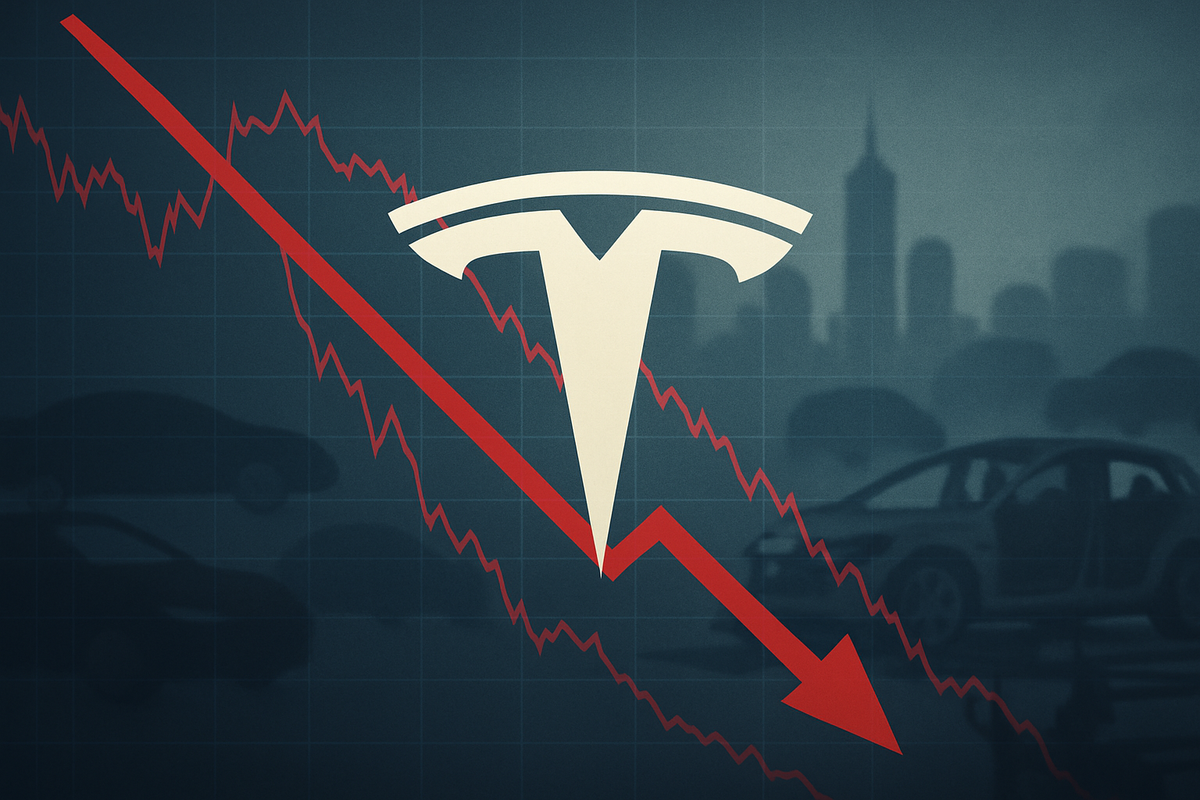Financial News
Tesla (NASDAQ: TSLA) Plunges 4.1% Amidst Production Concerns and Heightened Competition

October 3, 2025 - Shares of electric vehicle (EV) giant Tesla (NASDAQ: TSLA) experienced a notable downturn today, shedding 4.1% of their value as concerns over potential production bottlenecks and intensifying competitive pressures resurfaced in the market. This significant drop has sent ripples through the automotive sector, prompting investors to re-evaluate the company's near-term growth trajectory and its ability to maintain market dominance in an increasingly crowded EV landscape. The immediate implications point to a cautious sentiment spreading among investors, wary of any signs of deceleration from a company long synonymous with aggressive expansion and disruptive innovation.
Unpacking the Day's Decline: A Confluence of Factors
The 4.1% fall in Tesla's stock today appears to be a reaction to a combination of factors that have been brewing beneath the surface. While no single catastrophic event has been officially announced, market analysts are pointing to a confluence of whispers and reports that have collectively dampened investor enthusiasm. Chief among these are unconfirmed reports circulating within supply chain circles suggesting potential delays in the ramp-up of a key new production line, possibly impacting delivery targets for the upcoming quarter. This comes at a time when several legacy automakers, including General Motors (NYSE: GM) and Ford (NYSE: F), alongside new EV startups like Rivian (NASDAQ: RIVN), are aggressively expanding their own electric vehicle offerings, chipping away at Tesla's once-unassailable lead in various segments.
Adding to the unease, a prominent financial analyst firm reportedly downgraded its price target for Tesla, citing "growing macroeconomic headwinds" and "increased saturation in core EV markets" as primary reasons. This revised outlook, though not a direct indictment of Tesla's fundamentals, likely contributed to the selling pressure. The timeline leading up to this moment has seen a gradual accumulation of competitive launches and a general cooling in the exuberance that once characterized the broader EV market, making investors more sensitive to any negative news pertaining to market leaders. Key stakeholders, including institutional investors and retail traders, are closely monitoring official statements from Tesla, which has yet to publicly address the rumors or the analyst downgrade.
Market Repercussions: Winners and Losers in the EV Race
A significant dip in Tesla's (NASDAQ: TSLA) stock invariably triggers a reassessment across the entire automotive and technology sectors. In this scenario, traditional automakers that have been making substantial inroads into the EV market could be perceived as indirect beneficiaries. Companies like General Motors (NYSE: GM) and Ford (NYSE: F), which have invested heavily in their own electric vehicle platforms and are beginning to see increased production and sales, might find renewed investor interest. Their diversified portfolios and established manufacturing capabilities could be seen as a safer bet in a more competitive and potentially slowing EV market. Similarly, emerging EV players, particularly those focusing on niche segments or offering compelling alternatives, such as Rivian (NASDAQ: RIVN) in the truck and SUV space or Lucid Group (NASDAQ: LCID) in the luxury segment, could experience a slight uplift as investors look for alternative growth stories.
Conversely, companies heavily reliant on Tesla's success, such as certain battery suppliers or component manufacturers, might face increased scrutiny. While Tesla's scale is immense, any perceived slowdown in its production or delivery targets could lead to a re-evaluation of future orders and revenue projections for its partners. Additionally, the broader sentiment shift could impact other high-valuation growth stocks in the technology sector, especially those with similar narratives of rapid expansion and disruptive potential, as investors might become more risk-averse. The ripple effect extends to the financial markets, where short sellers might capitalize on the downward momentum, while long-term institutional investors may use this as an opportunity to either trim positions or accumulate shares at a lower price, depending on their conviction in Tesla's long-term vision.
Broader Industry Implications and Historical Context
Tesla's (NASDAQ: TSLA) 4.1% dip today, while significant for the company, also reflects broader industry trends shaping the future of mobility. The electric vehicle market is transitioning from its early adoption phase to a more mature, competitive landscape. This event underscores the increasing pressure on all EV manufacturers to not only innovate but also to execute flawless production and manage complex global supply chains efficiently. The "first-mover advantage" that Tesla once enjoyed is steadily eroding as traditional automotive giants leverage their decades of manufacturing expertise and extensive dealer networks to launch compelling EV models. This dynamic signals a shift where market share will be increasingly contested, and operational excellence will become as crucial as technological prowess.
Potential ripple effects extend to the entire EV ecosystem. Battery technology developers, charging infrastructure providers, and autonomous driving software companies will all feel the impact of any perceived slowdown in the leading EV player. Regulatory bodies globally are also closely watching market developments, particularly concerning competition and consumer choice. If established players gain significant ground, it could influence future policy decisions related to incentives, charging standards, and environmental regulations. Historically, rapid growth industries often experience periods of consolidation and increased competition, leading to market corrections for even the most dominant players. This scenario mirrors past cycles in the technology sector where early leaders faced intense pressure as the market matured and new entrants offered viable alternatives, forcing a re-evaluation of valuations and growth projections.
What Comes Next: Navigating a Shifting Landscape
The immediate aftermath of Tesla's (NASDAQ: TSLA) stock decline will likely see heightened volatility as the market digests the underlying concerns. In the short term, investors will be keenly awaiting any official communication from Tesla regarding its production outlook, delivery targets, or strategic responses to increased competition. A proactive and transparent response could help stabilize investor confidence, while silence might exacerbate fears. Long-term possibilities for Tesla include potential strategic pivots, such as doubling down on software and autonomous driving services, expanding into new energy solutions, or even considering strategic partnerships to bolster production capabilities or market reach in specific geographies. The company may need to adapt its aggressive growth strategies to account for a more competitive environment and potentially slower overall EV market growth.
Market opportunities could emerge for competitors who can demonstrate consistent execution and innovative offerings, particularly in segments where Tesla might be perceived as vulnerable or where demand is rapidly growing. Challenges for Tesla include maintaining its premium brand perception amidst a flood of new EV options, managing increasingly complex global supply chains, and navigating geopolitical tensions that could impact production and sales. Potential scenarios range from a quick rebound if the production concerns are unfounded or quickly resolved, to a more prolonged period of sideways trading or further declines if competitive pressures intensify and growth significantly decelerates. The coming months will be critical in determining Tesla's ability to adapt and reaffirm its leadership position in a rapidly evolving industry.
Comprehensive Wrap-Up: A Crossroads for the EV Pioneer
Today's 4.1% fall in Tesla (NASDAQ: TSLA) stock serves as a potent reminder that even market pioneers are not immune to the evolving dynamics of a maturing industry. The key takeaways from this event revolve around the intensifying competition in the electric vehicle sector, the criticality of consistent production execution, and the growing sensitivity of investors to any signs of decelerated growth. While Tesla remains a formidable force, the market is clearly signaling that its dominance is being challenged from multiple fronts, necessitating a re-evaluation of its growth premium.
Moving forward, the market will be closely assessing Tesla's ability to navigate these headwinds. Investors should watch for official quarterly reports for insights into production numbers, delivery figures, and profit margins. Any strategic announcements regarding new models, factory expansions, or technological breakthroughs will also be crucial. Furthermore, the performance of key competitors will provide a benchmark against which Tesla's relative strength will be measured. This event marks a significant moment, potentially signaling a new phase for the EV market where innovation must be matched by robust operational efficiency and strategic adaptability. While the long-term outlook for electric vehicles remains strong, the path to market leadership is becoming increasingly arduous and competitive.
This content is intended for informational purposes only and is not financial advice
More News
View More





Quotes delayed at least 20 minutes.
By accessing this page, you agree to the following
Privacy Policy and Terms Of Service.



